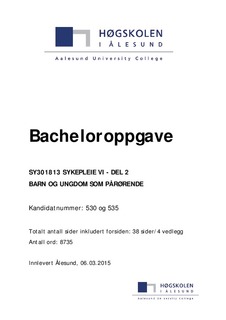| dc.contributor.author | Ulvestad, Anette Mekvik | |
| dc.contributor.author | Eriksen, Nathalie Ulvestad | |
| dc.date.accessioned | 2015-09-24T11:24:33Z | |
| dc.date.available | 2015-09-24T11:24:33Z | |
| dc.date.issued | 2015 | |
| dc.identifier.uri | http://hdl.handle.net/11250/301666 | |
| dc.description.abstract | Hensikt: Få en bedre forståelse av barn og ungdommers behov når de har en kreftsyk
forelder. Ved å fremheve deres perspektiv er tanken at oppgaven skal kunne bidra til at
barn og ungdom får ivaretatt sine behov av foreldre og helsepersonell.
Metode: Det har blitt utført en systematisk litteraturstudie hvor åtte forskningsartikler har
blitt inkludert. Videre ble det gjennomført en innholdsanalyse av artiklenes resultat.
Resultat: Barn forstår at noe er galt i familien og dersom de ikke får informasjon kan dette
føre til at de lager seg egne oppfatninger om sykdommen. Dersom barn ikke får
informasjon kan dette føre til at de føler seg ekskludert fra familien. De ønsket ærlig og
konkret informasjon om sykdom, prognoser og behandling. Barn hadde stor nytte av å
møte andre i samme situasjon.
Konklusjon: Barn har behov for ærlig og konkret informasjon fra begynnelsen. De må bli
sett på som individuelle personer med behov for tilpasset informasjon og oppfølging. Åpen
kommunikasjon kan føre til tillit mellom foreldre og barn, og føre til at de føler seg
inkludert i familien. Å møte andre i samme situasjon kan være et godt redskap for å mestre
hverdagen og gi en økt forståelse av situasjonen. | nb_NO |
| dc.description.abstract | Objective: To get a better understanding of what children and adolescents need when they
have a parent with cancer. By emphasizing their perspective the idea is that this study
should contribute to children and adolescents getting their needs taken care of by parents
and health personnel.
Methods: It has been conducted a systematic literature review were eight research papers
have been included. Then a content analysis was conducted of the article results.
Results: Children understand that something is wrong in the family and if they do not
receive information this can cause them to make their own perception of the illness. If
children do not receive information this might make them feel excluded from the family.
They wanted honest and concrete information about the illness, prognosis and treatment.
Children benefit from meeting others in the same situation.
Conclusion: Children need honest and specific information from the beginning. They
must be seen as individuals with needs for adapted information and follow – up. Open
communication can lead to trust between parents and children, and make them feel
included in the family. To meet others in the same situation can be a good tool to cope
with their daily life and provide a better understanding of the situation. | nb_NO |
| dc.language.iso | nob | nb_NO |
| dc.rights | Navngivelse-Ikkekommersiell-IngenBearbeidelse 3.0 Norge | * |
| dc.rights.uri | http://creativecommons.org/licenses/by-nc-nd/3.0/no/ | * |
| dc.subject | Pårørende : barn og ungdom | nb_NO |
| dc.subject | Pårørendes opplevelse | nb_NO |
| dc.subject | Kreftpasient | nb_NO |
| dc.title | Barn og ungdom som pårørende | nb_NO |
| dc.type | Bachelor thesis | nb_NO |
| dc.subject.nsi | VDP::Medical disciplines: 700::Health sciences: 800::Nursing science: 808 | nb_NO |
| dc.subject.nsi | VDP::Medical disciplines: 700::Clinical medical disciplines: 750::Psychiatry, child psychiatry: 757 | |
| dc.source.pagenumber | 50 | nb_NO |

